
Dr Monique Ryan tells the Coalition to ‘put your masks on’
In her first question to the parliament, the independent MP for Kooyong, Dr Monique Ryan, makes her mark:
Repeated infections with Covid-19 are [thought] to be more severe and carry a high risk of persisting symptoms for as long as six months, as well as an increased risk of hospitalisation and death.
There is increasing risk of cumulative neurological and cardiovascular disease from infections from Covid-19. Covid-19 infections in this country are at a record high and increasing. Can the minister please explain how he proposes to manage the oncoming national significant burden of disability and chronic illness – put your masks on* – from repeated infection …with Covid-19.
*This is directed at the Coalition side of the chamber which is still mostly mask-free. There are jeers in response.
Mark Butler:
I thank the member for Kooyong for her questions and she is actually is one of the large number of health professionals in the Parliament who will add depth to our health policy.
There can be no more important time then now because this pandemic is still ravaging our community. Official numbers record that more than 300,000 Australians each and every week of being infected with Covid and we know from zero sampling and other ways that the likely number is more than twice that.
We think that as many as half of Australia has contracted Covid just over the course of this year so far.
Our focus is on getting through this wave. We have extended support to state hospital system. We have expanded access to fourth-dose vaccines and antiviral treatment.
We are encouraging Australians again to be Covid-safe. In particular, as the member pointed out, to wear masks when indoors [and] are not able to socially distance.
As the member points out [and] the member for Higgins [Labor’s Dr Michelle Ananda-Rajah] pointed out in her beautiful speech this morning, we also need to come out to grips with long Covid. Long Covid is not easy to diagnose or treat.
The medical literature already reports more than 200 different symptoms being logged, most commonly involving fatigue, shortness of breath and what people are calling brain fog.
Some symptoms are disappearing after a few months; others experience quite specific … symptoms requiring specific interventions for example from a cardiologist.
More and more Australians are suffering longer term, multi-system disorders that prove hard to diagnose and treat.
The truth is, Mr Speaker, we don’t know [the] scale of the challenge.
A common estimate of about 4% of Covid patients experienc[ing] long-term symptoms already runs to hundreds and hundreds of thousands of Australian. Support is available through our standard medical system. States are operating long Covid clinics.
Their waiting lists are growing. It is increasingly clear to me that we will need to develop a focused response nationally to the phenomenon of long Covid.
I have already started work on the next phase of the government’s pandemic response, particularly beyond this winter and this third Omicron wave. I have already spoken to the Chief Medical Officer to introduce proposal around long Covid in particular.
I am keen to continue discussions with the member for Kooyong and other members of this place [regarding] this profound long-term health challenge that is proving so debilitating [and] distressing for so many Australian.
(A previous version of this post misidentified the member for Higgins being referred to as the Liberal’s Dr Katie Allen. This has been corrected to Labor’s Dr Michelle Ananda-Rajah. Sorry – subbing error!)
Key events
I am going to hand over the blog to Cait Kelly now, who will guide you through the evening. I will be back early tomorrow morning for another day of parliamentary fun. It’s party room meeting day tomorrow so there will be plenty from that.
And of course, plenty in the day itself, as climate, covid and the Voice all continue to dominate discussions (along with the economy, energy and all of the other things which keep our daily lives running)
Have a wonderful evening and please give all of the thanks to Mike Bowers for all the running around he did (as usual).
Thank you for joining me today. You are all the highlight of my week. See you tomorrow and in the meantime – as always, take care of you.

Paul Karp
The parliamentary library is advertising for researchers ranging from the APS4 to EL1 levels.
The reason that is significant is when Anthony Albanesewas hosing down controversy about cutting the crossbench staff allocation, he suggested the library would get more resources. But how many more staff? Nobody knows.
Last week a spokesperson for the finance minister, Katy Gallagher, told Guardian Australia:
Additional resources for the Parliamentary Library to better assist parliamentarians in their duties will be considered as part of the October Budget process.”
The job ad states:
Several current vacancies will be filled through this recruitment process. A merit pool will also be established to fill further ongoing or non-ongoing vacancies that may arise over the next 12 months.”
Among the eligibility criteria are “have an understanding of, and ability to analyse legislation” and to “be familiar with the legislative drafting process or have the ability to develop such knowledge”.
I think the crossbench staffers whose employment was just made redundant might know a thing or two about that!
Madeleine King is still doing the media rounds, speaking on the gas report the ACCC handed down this morning.
She is asked while on the ABC if the government would consider something like a profit windfall tax:
I think it’s unhelpful to link the issues into this issue is principally today we’re talking about a predicted shortfall.
LNP MP Terry Young is arguing against the Territory rights bill for a couple of reasons – he doesn’t think governments should have more powers for one.
And because the territories don’t have Senates, and therefore are not “properly equipped” to deal with laws like voluntary assisted dying.
Which is also true of the state he represents, Queensland. Which has passed VAD laws.
These photos never look natural
Plenty of gold already in Birmingham!
Wishing all our Aussie athletes the best of luck for the final week of the games.
Meanwhile, it’s great to be back in Parliament for the 2nd sitting week of the Albanese Government. pic.twitter.com/ne0ctFqeLD
— Brendan O’Connor (@BOConnorMP) August 1, 2022
Victorian health officials confident latest Covid wave has peaked

Adeshola Ore
Victoria appears to have passed the peak of its latest Covid wave that was fuelled by the new Omicron subvariants. Health officials in the state are confident cases and hospitalisation are now on the downslope.
Victoria’s chief health officer, Brett Sutton, said there has been a 10% reduction in case numbers compared to last week:
That’s good news and, as well, [we] would expect hospitalisation numbers also appear to be plateauing.
Sutton added that 10% of new cases are now reinfections, which adds a cumulative risk of long Covid:
People are at greater risk of heart attack, they’re at a greater risk of a stroke following a Covid reinfection.
From Mike Bowers’s lenses to your eyeballs:
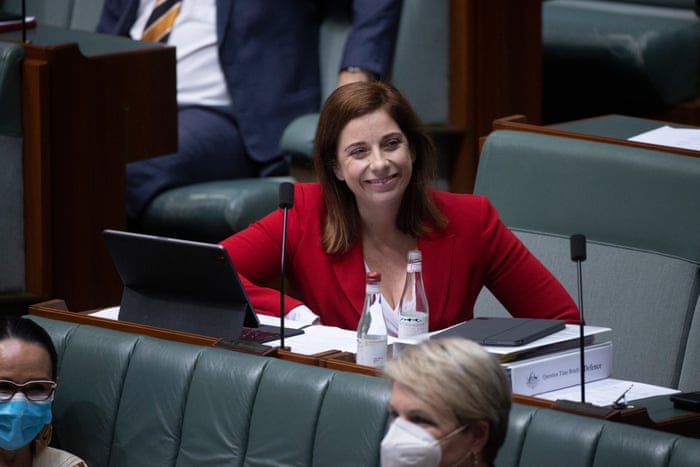
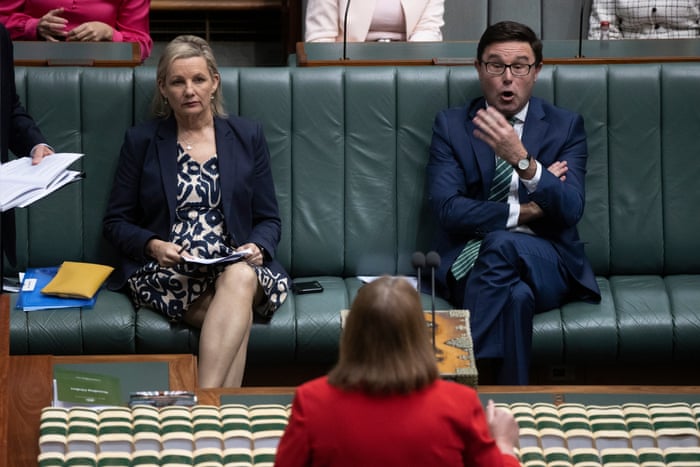
Fantastic. Good job.
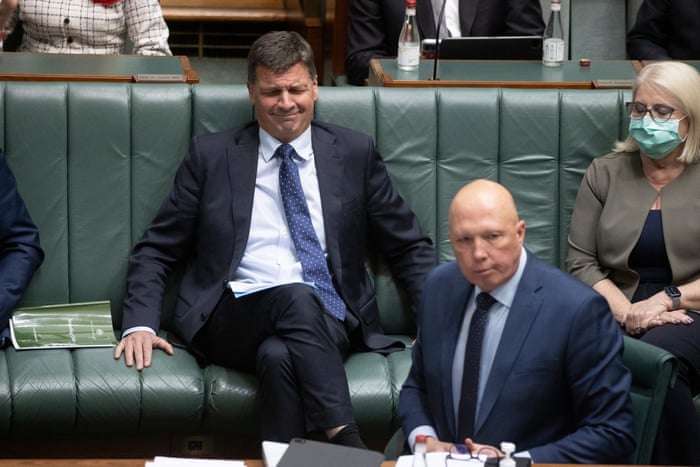
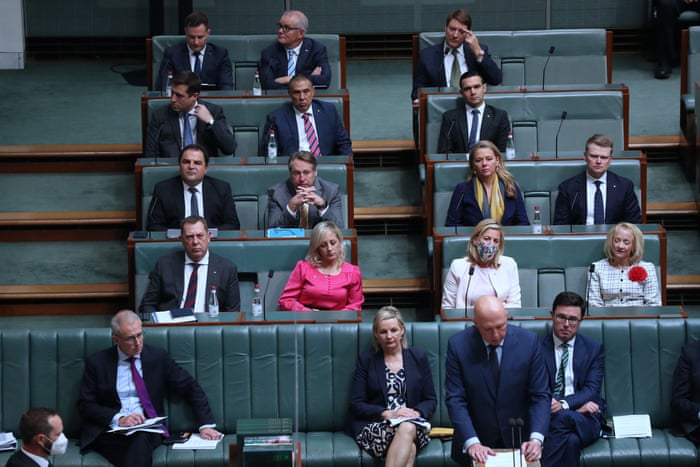
The second reading debate on the Territory rights bill has begun.
LNP MP Bert van Manen (for the division of Forde up in Queensland) wants to know if the standard of dress has been lowered in the house.
Milton Dick says it has not.
Not sure who van Manen is dobbing on, but as someone who wears pyjamas in most settings, I do not understand the policing on dress. However the parliament apparently does.
Littleproud: Labor misrepresenting May tweet about foot-and-mouth disease
David Littleproud is giving a personal explanation because Labor keeps referring to his tweet about foot and mouth disease, but he says they are not reading the whole tweet.
He is pointing out that under the standing orders, once someone has made a correction, the speaker can step in and stop the misrepresentation on board.
Milton Dick says he will “reflect on his view”.
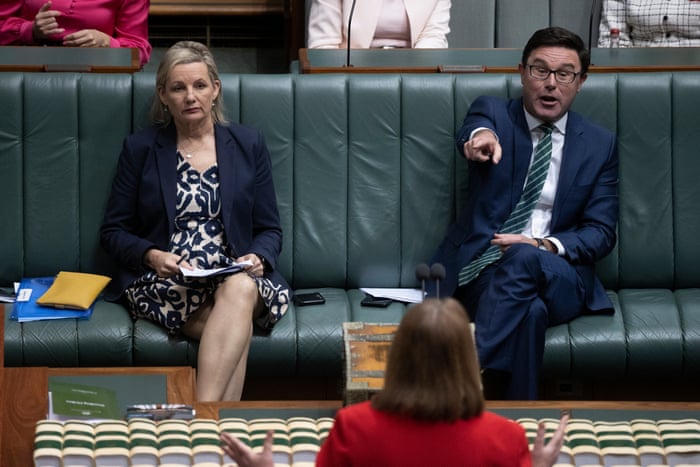
Move to allow Territory rights bill to be debated immediately
Labor’s Tony Burke is moving to suspend standing orders to allow the debate of the second reading of Luke Gosling’s restoring territory rights bill immediately – and then have the debate sent to the Federation chamber for the rest of the day.
This is part of the “urgent” bill standing orders the government introduced last week.
Paul Fletcher, the Liberal’s manager of opposition business, says this is a “government determined to ram matters through as quickly as it can” and seems happy to be able to say “I told you so” in parliamentary language.
Question Time ends
And it ends a little earlier than usual, which prompts some surprise from the opposition.
Albanese: not having nurses in aged care homes will affect emergency departments
Sussan Ley to Anthony Albanese:
When asked about how many nurses would be required in aged care to meet your election commitment your minister said 869 nurses were required. Can the prime minister please confirm that to meet your election commitment in full, only 869 nurses will be required in aged care homes?
Albanese:
I’m quite happy to take a question from the deputy leader of the opposition about aged care. Because we went to the election with a comprehensive plan to fix aged care, putting nurses back into nursing homes 24 hours a day, because we know that’s one of the issues having an impact on emergency departments.
If you don’t have a nurse in a nursing home, when an elderly person gets sick, they can often end up getting an acute health condition because there is not someone onsite to help them. That’s what the royal commission said and what we are responding to and … I [am] finally just beyond comprehension that after nine years of neglect from those opposite on aged care, after having an aged care royal commission which made very clear recommendations … the response of the opposition is to come in here and ask questions like this. Not to ask questions…
Ley stands up on a point of order which Dick says is not a point of order.
Milton Dick:
I want to remind all members of the house, simply raising points of order about relevance to disrupt Question Time will not be tolerated and I simply will not take the point of order if this continues. Order. I call the prime minister.
Albanese:
I was asked question about nurses in nursing homes and those opposite are saying is that it’s not relevant … the consequences of not having a nurse in a nursing home. That’s what they are saying.
We had a very clear plan about nurses in nursing homes. We had a very clear plan about 215 minutes of care. A very clear plan about more accountability for the operators of nursing homes, a very clear plan about the nutrition in nursing homes for aged care residents. Because we know that over half, according to the royal commission, over half of aged care residents were not getting the nutrition they need. They [were] literally starving.
This is the issue befalling Australians and I say to the opposition, do you think seriously about the impact of those people watching this at home who have mum or dad or grandpa or grandma or their sister or brother in an aged care home, worried about the impact which is there, worried about the deficiencies that have been identified by the aged care royal commission, and you know what they are saying around the country?
They are saying, we want a nurse in a nursing home. They are saying we want 215 minutes of care. They are saying, we want better nutrition. They say they want their accountability. Those opposite … show with this line of questioning how completely out of touch they are.
Peter Dutton stands up on indulgence:
I join with the prime minister’s sentiment in doing the best for those in aged care facilities, that is absolutely the desire and the approach of this Coalition, Mr Speaker. We will support measures by the government which will go to providing support to those in aged care facilities. This question was about how many nurses are needed…
Milton Dick is not happy:
I gave indulgence to the leader of the opposition because of the position that he holds. I will not have the use of indulgence used for political point scoring.
Wells confirms government will need 869 new nurses to pursue 24/7 aged care support
Sussan Ley to Anika Wells:
I refer the minister to her answer last [session] that 869 new nurses would be needed for policy. In April, when asked about the number of nurses needed, now [the] minister for home affairs said we will need to bring in [the] low thousands, somewhere between 2,000 to 3,000 new people. Was the minister for home affairs [wrong] or did you, minister, mislead the House?
Wells:
I welcome the opportunity to speak of workforce numbers and shortages. Particularly the numbers that came out at estimates, I think it was 1 April from the top of my head. I think it is important to note that these numbers were the modelling of the then Morrison government when being told about workforce shortages.
The difference, Mr Speaker, is that we are actually doing something about it. We are doing something about workforce shortages.
They were given a second report and the theme of today that they chose not to tell people about. They were told the bad news and decided not to tell Australians anything about it and to try and skate through. So yes, when we’re talking about workforce, there are different numbers …
Ley:
On relevance: was the member for Hotham wrong or…
There is no point of order.
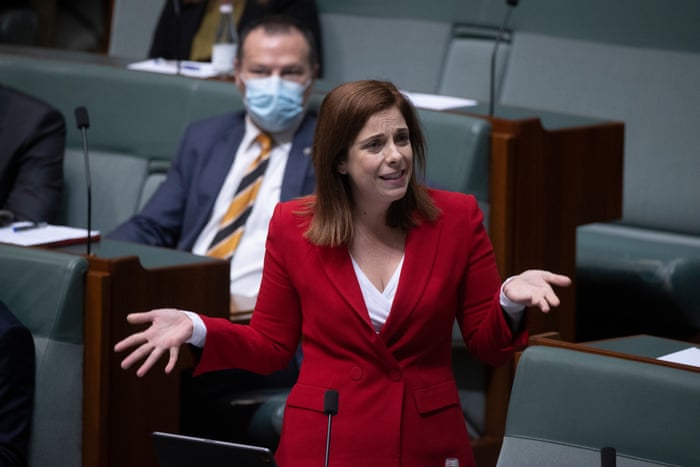
Wells:
Yes, the number is still 869, and it was 869 when you didn’t do anything about it and was thousands at the 200 care minutes, which is the other commitments you speak about often. The thing to note is when protectively asking us about where these workers will come from, it was a problem you chose to do nothing about.
You had this problem for years and years and … it is probably worth noting at this point, when we talk about aged care workforce shortages, where did it stem from? It stems from December 2013, when one of the first actions of the Abbott government was to cut the aged care workforce government compact.
Paul Fletcher gets up and Dick asks Wells if she has concluded her answer:
Wells:
No I haven’t.
So Fletcher gets his point of order – it’s on Wells’ use of “you” instead of titles. (So many people in this place reveal themselves as the classroom nark everyday.)
Dick asks Wells not to use “you” and Wells continues:
Is that if that is the most burning thing they can raise, I think that shows when we talk about workforce shortages.
This started in 2013 when one of the first acts of the Abbott government was to suspend standing orders in the House to cut the aged care workforce compact. It was one of the first things that cut workers’ rights and put us down this track. Who was the health government at this very moment when orders were suspended? Who was the health minister?
[It was] the now leader of the Opposition. He was the one who was health minister when they suspended standing orders to cut the ageing care workforce numbers Compact.
We are upfront about this. It will require thousands of workers to come back online to fix the problem. That is why we are trying to give them a pay rise. We will need 869 nurses to meet our 24/7 nursing requirement. That [was] the question you asked me on Thursday and I answered.
I think, Mr Speaker, you said if you want a different answer: ask a different question. Broadly, as you know from the second report [the Coalition] strive[s] to do nothing about, thousands of personal carriers, kitchen staff and others in aged care will be required to get to what is a better standard of care.
They are quibbling over how we work to get a better standard of care and, really, after 9 years of neglect a better standard can’t come soon enough.
Standing order 98C limit questioners, not answers
Paul Fletcher has a very long point of order in the middle of Chris Bowen’s dixer:
It goes to the question to the extent to which ministers are given free rein to give their own interpretation of what has happened over the last 10 years.
Standing order 98C is quite clear on the range of questions to which ministers can be asked about.
It is restricted to public affairs administration the well understood requirement that the answer must be relevant to the question. It can’t be appropriate that there is a construct under which a minister is asked a question which invites him to reflect in the broadest possible terms of the conduct of previous government*. He should be telling the Australian people what the Albanese government’s plans are to solve the problem.
*Again, just choking on the irony over here, given the number of dO yOU kNoW oF AnY AlterNAtiVe apProacHEs in Morrison government dixers.
Tony Burke responds:
Just for the point of order for the benefit of the manager of opposition business. The standing order he referred to at the start carries rules for the question. They apply to the questioner.
Standing order 104 is the one that refers to the answers. That is the standing order that refers to the minister. It is not a valid point of order to use standing order 98 to try to limit what is in an answer. This question specifically included what are the consequences of a failure to act. The minister is being specifically relevant to it.
Milton Dick says he is listening to both the questions and the answers.

Peter Hannam
Victoria and South Australia running at a sub-zero price on power today
I think we’ve settled on a standard Q&A between the opposition and the Albanese government over electricity prices. The former will keep asking when Labor’s promise of a cut of $275 in average annual household power bills will kick in, and the government will respond by saying the Morrison government deliberately delayed the release of the default market offer (and thus delayed exposing higher power prices).
Details of the power price delay were first reported here (as far as we can tell), which was pretty brazen – and set a booby trap of sorts for the next government. It’s not clear when the $275 price cut was meant to kick in by, and what the baseline is.
Perhaps we should start the clock on from this quarter?
For what it’s worth, Victoria and South Australia – thanks to good wind and sunshine today – are both operating at a sub-zero price of power in the national electricity market at about minus-$30 per megawatt hour, as we type.
As for next year, there’s continued falls in the recent week, but they have a long way to go before they get back reliably below $100/MWh.
Dr Monique Ryan tells the Coalition to ‘put your masks on’
In her first question to the parliament, the independent MP for Kooyong, Dr Monique Ryan, makes her mark:
Repeated infections with Covid-19 are [thought] to be more severe and carry a high risk of persisting symptoms for as long as six months, as well as an increased risk of hospitalisation and death.
There is increasing risk of cumulative neurological and cardiovascular disease from infections from Covid-19. Covid-19 infections in this country are at a record high and increasing. Can the minister please explain how he proposes to manage the oncoming national significant burden of disability and chronic illness – put your masks on* – from repeated infection …with Covid-19.
*This is directed at the Coalition side of the chamber which is still mostly mask-free. There are jeers in response.
Mark Butler:
I thank the member for Kooyong for her questions and she is actually is one of the large number of health professionals in the Parliament who will add depth to our health policy.
There can be no more important time then now because this pandemic is still ravaging our community. Official numbers record that more than 300,000 Australians each and every week of being infected with Covid and we know from zero sampling and other ways that the likely number is more than twice that.
We think that as many as half of Australia has contracted Covid just over the course of this year so far.
Our focus is on getting through this wave. We have extended support to state hospital system. We have expanded access to fourth-dose vaccines and antiviral treatment.
We are encouraging Australians again to be Covid-safe. In particular, as the member pointed out, to wear masks when indoors [and] are not able to socially distance.
As the member points out [and] the member for Higgins [Labor’s Dr Michelle Ananda-Rajah] pointed out in her beautiful speech this morning, we also need to come out to grips with long Covid. Long Covid is not easy to diagnose or treat.
The medical literature already reports more than 200 different symptoms being logged, most commonly involving fatigue, shortness of breath and what people are calling brain fog.
Some symptoms are disappearing after a few months; others experience quite specific … symptoms requiring specific interventions for example from a cardiologist.
More and more Australians are suffering longer term, multi-system disorders that prove hard to diagnose and treat.
The truth is, Mr Speaker, we don’t know [the] scale of the challenge.
A common estimate of about 4% of Covid patients experienc[ing] long-term symptoms already runs to hundreds and hundreds of thousands of Australian. Support is available through our standard medical system. States are operating long Covid clinics.
Their waiting lists are growing. It is increasingly clear to me that we will need to develop a focused response nationally to the phenomenon of long Covid.
I have already started work on the next phase of the government’s pandemic response, particularly beyond this winter and this third Omicron wave. I have already spoken to the Chief Medical Officer to introduce proposal around long Covid in particular.
I am keen to continue discussions with the member for Kooyong and other members of this place [regarding] this profound long-term health challenge that is proving so debilitating [and] distressing for so many Australian.
(A previous version of this post misidentified the member for Higgins being referred to as the Liberal’s Dr Katie Allen. This has been corrected to Labor’s Dr Michelle Ananda-Rajah. Sorry – subbing error!)
It’s not exactly the more respectful question time which was promised, but I think we all knew that was going to be a harder task than asking me to give up potato.
And I will never give up potato.


